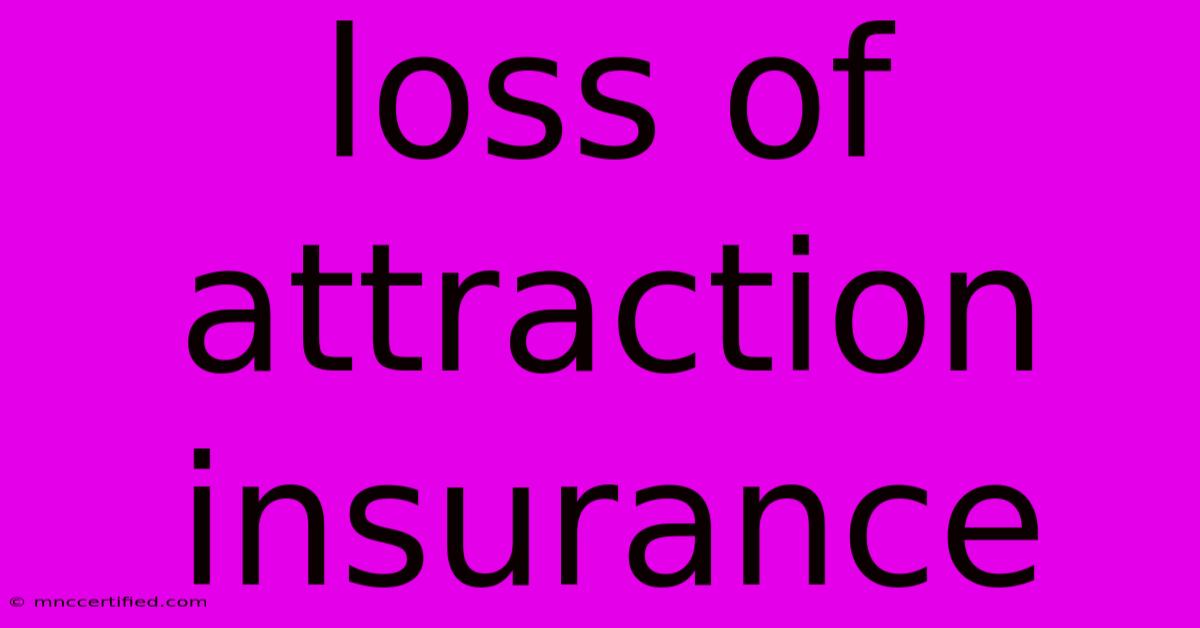Loss Of Attraction Insurance

Table of Contents
Loss of Attraction Insurance: A Comprehensive Guide
Losing attraction in a relationship is a common concern, and while it's not typically covered by traditional insurance, the emotional and financial consequences can be significant. This article explores the concept of "loss of attraction insurance," clarifying what it is and isn't, and offering practical strategies to mitigate the risks associated with waning attraction in a relationship. We'll delve into relationship advice, financial planning, and legal considerations to help you navigate this sensitive area.
What is (and isn't) "Loss of Attraction Insurance"?
There's no formal insurance policy labeled "loss of attraction insurance." The term itself is a metaphorical representation of the need to proactively protect oneself from the emotional and financial repercussions of a relationship breakdown caused by a loss of attraction. Instead of a specific policy, we're talking about a holistic approach that involves:
1. Protecting Your Financial Well-being:
- Pre-nuptial Agreements: Before marriage, consider a prenuptial agreement that outlines the division of assets in case of separation. This is crucial for protecting your finances, regardless of the reason for the split, including loss of attraction.
- Separate Finances: Maintaining some degree of financial independence throughout the relationship ensures you won't be completely vulnerable if the relationship ends. This includes having your own savings, investments, and credit.
- Financial Planning: Regularly review your financial goals and plan for various scenarios, including the possibility of a relationship ending. This might involve building an emergency fund and investing wisely.
2. Investing in Relationship Health:
- Open Communication: Honest and open communication is paramount. Regularly discussing feelings, needs, and concerns can help address issues before they escalate into a major problem.
- Couples Therapy: Don't hesitate to seek professional help if you're experiencing difficulties. A therapist can provide tools and techniques to improve communication and navigate challenges.
- Shared Activities: Maintaining shared interests and hobbies helps to keep the connection alive and prevents feelings of stagnation.
- Self-Care: Prioritizing your own well-being – physical, mental, and emotional – is essential. A healthy and happy individual is more likely to contribute to a healthy relationship.
3. Legal Protections:
While there's no insurance against loss of attraction, legal frameworks exist to protect your rights and assets in case of separation. Understanding family law and your rights is essential, especially if children are involved.
Addressing the Root Causes of Attraction Loss
Loss of attraction is rarely a singular event but often stems from underlying issues:
- Lack of Communication: Unspoken resentments and unmet needs can erode attraction.
- Stress and External Factors: Work pressures, financial difficulties, or health problems can impact intimacy and connection.
- Lack of Personal Growth: When individuals stop growing and evolving, the relationship can stagnate, leading to a decline in attraction.
- Unresolved Conflicts: Lingering disagreements and unresolved conflicts can create distance and resentment.
Conclusion: Proactive Strategies are Key
While a "loss of attraction insurance" policy doesn't exist, a proactive approach to relationship health and financial planning provides a strong safety net. Open communication, professional help when needed, and a focus on individual well-being are crucial for fostering a lasting and fulfilling relationship. Remember, focusing on preventative measures is far more effective and less costly than dealing with the aftermath of a relationship breakdown. Prioritize your well-being and financial security to navigate the complexities of relationships and mitigate potential risks.

Thank you for visiting our website wich cover about Loss Of Attraction Insurance. We hope the information provided has been useful to you. Feel free to contact us if you have any questions or need further assistance. See you next time and dont miss to bookmark.
Featured Posts
-
Insurance For Staffing Firms
Dec 01, 2024
-
Forest Edges Ipswich 1 0
Dec 01, 2024
-
Big Ten Title Game Scenarios
Dec 01, 2024
-
San Juan Insurance Companies
Dec 01, 2024
-
Insurance Products For Telco
Dec 01, 2024